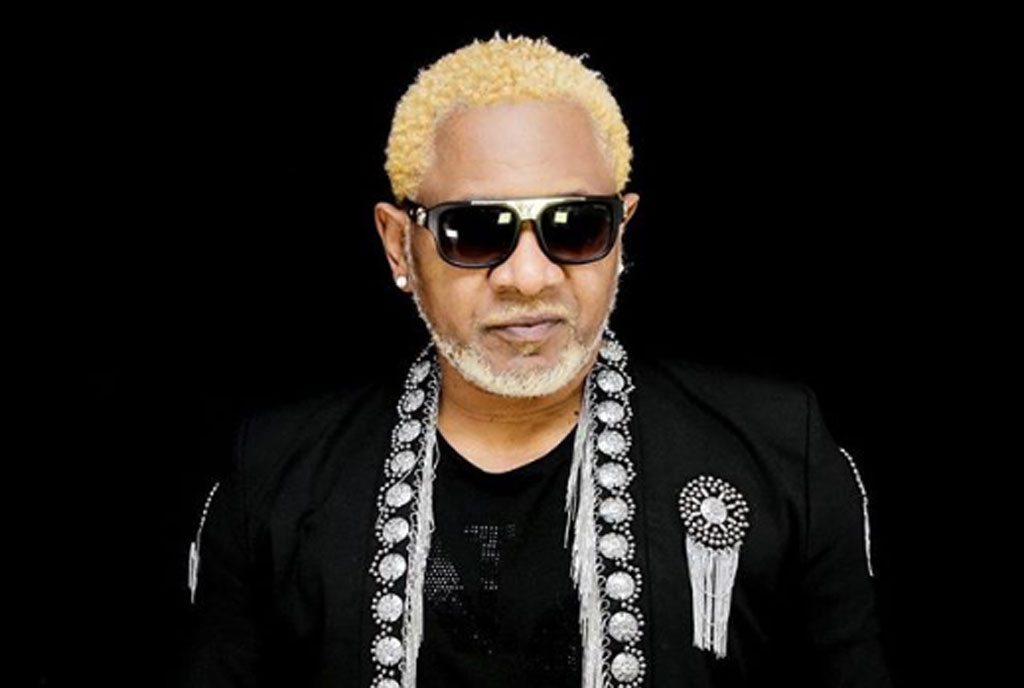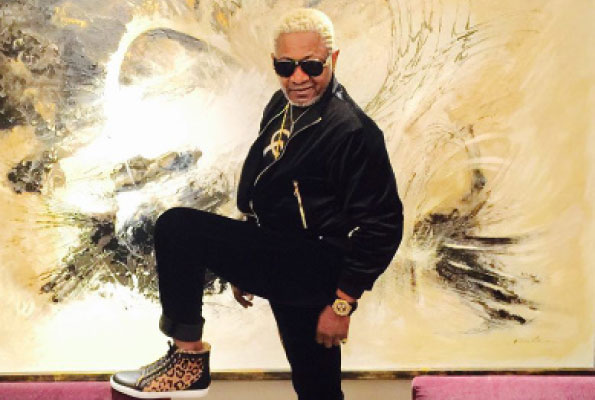Lingala time: Celebrated Congolese artiste Awilo Longomba will be in concert in Kampala tonight and in Arua on Sunday, returning to the country almost 10 years later, writes Jacobs O. Seaman.Awilo Longomba will be exactly a month shy of his 57th birthday when he steps on stage at Serena hotel tonight to entertain his fans in Kampala. Twenty-four years ago, the Congolese musician would scream like he was possessed and dance like he was on contaminated aviation fuel. His short locks, atop shaven nape and sides of his head, was trendy. But a lot has changed. Awilo now spots silver hair and beards but do not put anything past him — he insists he still got it.
“I’m made for hard hits, I give hard shots,” Awilo said.
Cents Events director Vincent Nsubuga, the organisers of the show, says Awilo will have two hours to rewind the clock 24 years for his rumba fans.
In a brief video, Awilo is seen with Nsubuga, comedian Patrick ‘Salvado’ Idringi and Eddie Kenzo promoting his shows. He does a Capella of Moyen Te, one of his biggest hits from the 1995 breakthrough album, Moto Pamba.
Back then, he came to Kampala and left everyone dripping with sweat from his screams and dance and Yondo Sister, a soukous musician, thinks all it takes is one having to do their own songs.
“I haven’t seen Awilo perform in a while but as long as they are his own songs, he will be performing them without a problem,” she said.
Diblo Dibala, the Loketo Group leader who played a key role in convincing Awilo to make his voice more famous than his fingers were on drums and conga, said the musician is versatile.
“Awilo is naturally gifted, he has been changing and adapting to styles that suit his audience. By the time he gets to his audience, he already knows what they want and gives it to them,” he said.
Born Albert William Longomba on May 5, 1962, Awilo (coined from the first two letters in his name) had to rebel to follow in his father’s footsteps.
In 1971, Vicky Longomba, founder of OK Jazz, was faced with rebellion in his family. Like Franco Luambo Makiadi, Vicky had gone into music to escape poverty. Neither man wanted their children in music; they wanted them in school.
Ironically, Awilo would want to see his children in music, but none seems interested.
“I have six children, I thought they would want to become musicians but it is only the last born who is showing interest as he makes a lot of noise every time he is awake,” he said.
Awilo started spending more time watching music rehearsals than in school. By 1980, it was clear where his heart belonged. But unlike his father and siblings — including his older sister, the mother of French soccer legend Claude Makelele — who were mainly vocalists, Awilo settled for drums.
Finding Success
His first stop was Stukas of Lita Bembo before he joined Papa Wemba’s Viva la Musica Band, where he enjoyed a round of global tours. By 1990, he was a celebrated drummer and attracted a host of musicians across the continent on his fingers.
But his fate started changing after he joined Loketo. Diblo Dibala thought Awilo could make a better mark singing than drumming. When he left Loketo to form Matchatcha in 1991, he took with him Awilo and for his first album, Boum Tonnere, Awilo led vocals in the song, Vouma.
“I featured in over 100 albums as a drummer before I went solo. But I am not the greatest drummer,” he said in 2016.
“Among those who came before me, I respect Sesko Molenga. He was the first recognised drummer in Congo. And, of course, Marie Jose from Zaiko, Pojos of TPOK Jazz, Bellow Mafwala and my friend Simolo Kakol.”
He also featured for many musicians, including Gabonese zouk musician Oliver N’Goma, with whom he performed in Uganda early in the 90s.
In 1994, Awilo composed eight songs and assembled a cast of musicians to back him up. With himself as drummer and lead vocalist, he had Simaro Lutumba. Ngouma Lokito, Dally Kimoko, Caien Madoka and Rigo Stars on his strings.
Abby Surya, Lucien Bokilo, Shimita, Dindo Yogo, Canta Nyboma and Ballou Canta joined the vocals.
When he released the product of this effort in 1995, Moto Pamba album shot Awilo to global fame.
“People encouraged me to sing and I did just that. I let go of the drums and started singing,” he says.
In 1997, he teamed up with Joycelyne Beroard, the Guadeloupe founder of zouk genre, who wrote Coupe Bibamba, the lead track on his 1998 album by the same name.
Awilo’s screams and revved up performance had become his signature and in Coupe Bibambo, he had the ultimate techno soukous. It was so popular that few cared for the message he delivered in the song.
“In Coupe Bibamba, I encourage children to go to school, church and believe in themselves so that they can eradicate poverty in Africa,” he says of the song in which Abby Surya (Kanda Bongo Man’s Muchana vocalist) and Beroard wowed as backup.
The album also had Manon, about his daughter by the same name, and Porokondo, a song calling for humility in hard times as much as in wealth. In the song, he throws a mabanga (praise given to people) at Robert Ogwal, aka Rasta Rob, then one of the most popular radio presenters in the Great Lakes Region.
In 2001, he tapped into Togolese soukous songbird Nimon Toki Lala, turning her song, Bibala Bala, into his own. It started his love for collabo with musicians around the continent. He has since recorded with P-Square, Tiwa Savage, Yemi Alade, and VJoj and featured popular figures like Ezinne Asinugo in the song Bundele.
“I love rumba, but I ventured into techno soukous after realising that people loved music that got them dancing. Old school rumba is best listened to while relaxing, so I introduced rap in soukous,” he says.
Like Bundele, a song of just seven lines comprising two main words “Bundele and bu.” It runs 3:54 seconds. But ho! It can get a patient shaking their body.
Cents Events has included a host of local artistes on the line-up to entertain fans alongside Awilo and his 14-man band. Cindy, Jackie Chandiru, Kenzo, Levixone and others will spice up the rumba experience in Kampala and in Arua where Awilo Longomba’s biggest followers in the country are based.
“Many of us grew up listening or dancing away to his music, and we can already feel the nostalgia, thinking about how incredible the experience is going to be,” Nsubuga said.

